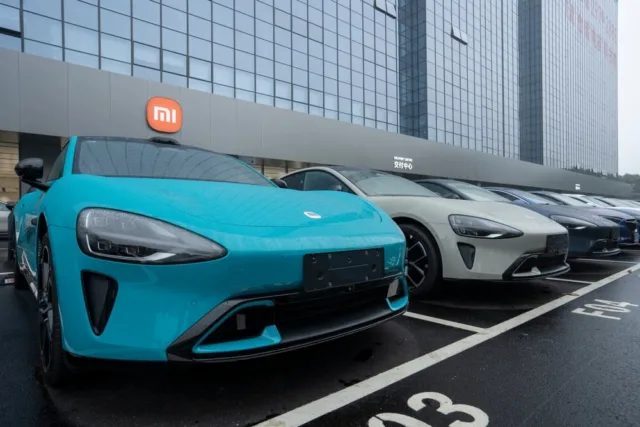As per reports, Chinese tech giant Xiaomi is gearing up to launch its first electric vehicles (EVs) in Europe by 2027. The announcement came during the company’s second-quarter 2025 earnings call, where President Lu Weibing revealed the milestone. The move marks Xiaomi’s first international expansion for its automotive division and reflects the brand’s rising ambitions fueled by explosive EV sales in China.
Xiaomi’s Strong Q2 2025 Fuels European Ambitions
Xiaomi’s car unit has quickly turned into a powerhouse. In the second quarter of 2025, the company delivered 81,302 EVs, raking in 20.6 billion yuan ($2.87 billion) in revenue. That’s a staggering 232% year-over-year jump, proving the brand’s rapid rise in the world’s largest electric vehicle market.
The company’s total revenue climbed 30.5% year-over-year to 116 billion yuan ($16.1 billion), beating analyst expectations. Much of this success was driven by the overwhelming demand for the Xiaomi YU7 SUV, launched in June 2025.
Notably, Xiaomi stock has strong trading volumes and a current price of around 52.55 HKD per share.

Boosts Green Power and Cuts Emissions
In the first half of 2025, Xiaomi used around 7.2 million kWh of renewable electricity, more than 270% higher than the year before.
- Its EV factory also produced 6.9 million kWh of solar power, cutting over 4,160 tonnes of carbon emissions.
In short, Xiaomi is running its factories on much more clean energy, especially solar, and reducing thousands of tonnes of carbon pollution.

Analysts Say Xiaomi Could Be Tesla’s Biggest Global Threat
Tesla’s dominance in China, its largest international market, has been fading. Data shows shipments plunged 49% year-over-year in February 2025, dropping to just 30,688 units—its lowest monthly sales since July 2022.
By April, Tesla’s China-made EV sales had declined for the seventh consecutive month, down 6% year-over-year.

YU7 Sparks Frenzy with Record Orders
The YU7 SUV stormed into the Chinese market with unprecedented demand. Within the first 18 hours, Xiaomi received 240,000 locked-in orders, a record-breaking performance that stunned industry watchers.
The Standard trim of the YU7 boasts an estimated range of up to 519 miles, outshining Tesla’s comparable offering. With its 800V charging platform, the vehicle can add 620 km (385 miles) of range in just 15 minutes of charging. By contrast, Tesla’s Model Y takes about 27 minutes to charge from 10% to 80%.
Furthermore, the YU7 SUV starts at 253,500 yuan ($35,300), making it a direct competitor to Tesla’s Model Y but priced nearly 10,000 yuan cheaper.
Thus, this combination of affordability, superior specs, and advanced charging infrastructure has made the YU7 one of the hottest EVs in China.
Felipe Muñoz, global analyst at JATO Dynamics, explained,
“Persistently high prices, geopolitical tensions, and competition from BYD and Volkswagen are making it harder for Tesla to maintain its leadership.”
He further added,
“The new Xiaomi is probably Tesla’s largest threat so far, not only in China but globally.”
Significantly, Xiaomi’s first model, the SU7 sedan, was also a hit. Since its debut in spring 2024. S&P Global says, in total, Xiaomi has delivered more than 258,000 vehicles since entering the EV market.
Chinese EVs Capture and Compete in Europe
Xiaomi’s European push comes at a time when Chinese automakers are rapidly expanding their presence across the continent.
- Bloomberg reported, in June 2025, Chinese manufacturers captured 10.6% of all EV registrations in Europe, rebounding from EU tariffs imposed a year earlier.
- In April 2025, BYD even overtook Tesla in Europe for the first time, selling 7,230 battery-electric vehicles compared to Tesla’s 7,165.
Tesla (TSLA stock) is trading near $324, down about 18% in 2025. Global sales dropped 13% in the first half; Europe was hit the hardest. The only thing investors are optimistic about is Tesla’s self-driving tech and robotaxi plans. They are now seeing them as drivers of long-term growth.
Coming back to the competition, it is intense! Traditional automakers, led by Volkswagen Group, are defending their turf, while Chinese companies like BYD, Xpeng, and now Xiaomi are pushing hard to capture market share.
According to Reuters,
- Chinese brands nearly doubled their European market share to 5.1% in the first half of 2025, closing in on Mercedes-Benz’s 5.2% share.
- Registrations of Chinese EVs surged 91% year-to-date, with BYD leading the pack after registering 70,500 units, a 311% jump from a year earlier.
Meanwhile, European giants like Stellantis saw declines. Stellantis’ market share fell to 15.3% from 16.7%, while Tesla dropped to 1.6% from 2.4% during the same period.

Big Ambitions, Long Wait Times: Can Xiaomi Win Over Europe?
Xiaomi chose Europe as its first stop despite tough competition and strict regulations. Reports reveal that it set up an R&D center in Munich, led by ex-BMW exec Rudolf Dittrich, and hired five senior BMW executives to adapt vehicles for local preferences.
The SU7 Ultra has already been test-driven in Munich, marking Xiaomi’s first registered European vehicle. However, limited production means delivery waits exceed 52 weeks, and CEO Lei Jun suggested buyers consider alternatives like Tesla’s Model Y.
Scaling manufacturing and supply chains will be key for Xiaomi to reach its goal of becoming a top global automaker. With Tesla losing ground and BYD ahead on sales, Xiaomi’s ecosystem-driven EVs could make it a serious global competitor.









